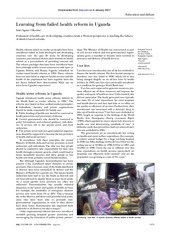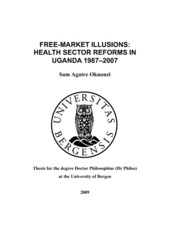| dc.description.abstract | Introduction: By the late 1980s, Uganda’s health system had been devastated by two decades of conflict and mismanagement. At the same time, public-funded and run health systems had begun to be viewed as inefficient and undesirable. Uganda’s attempt to rehabilitate its destroyed health infrastructure was blocked by donors in favour of reform. Introduced as pre-conditions of aid, market-based health sector reforms (HSRs) were eventually embraced by the government of Uganda as part of the wider globalized free-market policy to provide market solutions to health sector problems. The reforms were driven by ideology; they were untested and not based on evidence. Theoretical framework: The research develops a conceptual framework for critical analysis of HSRs as a policy of the free-market system, and uses policy analysis framework of Hogwood and Gunn, which starts from policy agenda setting and ends with policy maintenance, succession or termination. Where a policy fails or becomes irrelevant, it is succeeded by another policy and terminated. It also employs Raskin et al’s transition-and-trend prediction of the future; that uncontrolled free-market capitalism is hungry for markets, resources and investment opportunities with dire consequences of social polarization, terrorism, environmental degradation, climate change and breakdown of welfare, such as health care. Two possible scenario options are predicted: either to reform the free-market policy or develop a new civilization. Aim and objectives: The aim of the study was to explore the implications of market-based health sector reforms in Uganda for the development of sustainable health systems. The objectives were to 1) analyse the genesis, formulation and implementation of HSRs in Uganda; 2) to evaluate the performance of the health sector under HSRs; 3) to evaluate HSRs collectively and individually; and 4) recommend a framework for sustainable health systems. Methods: Four main methods were used in the study: a) Several evaluation studies of HSRs in Uganda were done. Ugandan studies were done in thirteen pilot health reform project districts. Evaluation studies included several separate thematic sub-studies. Most studies employed interviews, focus-group discussions, and structured observation; b) A study was done to compare Uganda’s reform with those in other countries under a bi-country study and through a review of multi-country studies; c) Systematic reviews and analyses of various household and health-facility surveys were carried out; and d) A sub-district health systems survey was carried out to assess health system inputs, functions, outcomes and efficiency. Results: Health indicators stagnated or deteriorated during the period under study. Only slight improvements have occurred recently but are associated factors outside the health sector. Of the twenty reforms, only two achieved success: setting up private facilities and community-based distribution of health commodities. Eight failed to achieve individual objectives (user-fees, pricing of health care, defining and implementing an essential health package, hospital autonomy, decentralization, contracting out, sector wide approaches, and restructuring of ministry of health). Seven reforms were not sustainable or feasible (revolving drug funds, prepayment schemes, social-health insurance, income generation for health care, payment incentives, hospital trusts and autonomy or privatization of National Medical Stores). Three reforms were found to undermine health sector objectives, especially that of equity (user-fees, privatization, and decentralization). Factors complicating HSRs include aid, macroeconomic Sam Okuonzi 12 policy, policy on economic growth, corruption, inadequate internal management capacity, and ad hoc nature of reforms in general. Discussion: The failure of market-based HSRs to achieve collective and individual objectives in Uganda is a trend also documented in other countries. The characteristics of a good health system (such as equity, solidarity, evidence-based decisions, government leadership and control, and regulation) cannot be achieved through privatization and market forces. Moreover, HSRs are linked to a much wider and entrenched socio-economic global system established and driven by free-market capitalism. Health systems crises cannot therefore be addressed independently of the wider global economic order. Either there has to be policy reform within the prevailing framework of the free-market, focussed on addressing perpetual crises as they emerge, or a new world order based on different values has to be defined and the human society has embark on the path of a new civilization. It is envisioned that only when the values upon which the free-market is based (such as materialism, winner-takes-it-all, individualism, and domination of others) are replaced with other values (such as equity, solidarity, mutual existence, and shared responsibility), will there be a suitable environment for sustainable and equitable health systems development. Conclusions, lessons and recommendations: The health system crisis in Uganda is due to freemarket policy, introduced through and driven by donor aid and its poor management. It was also due to poor leadership and governance in Uganda. Market-based approaches need close control and regulation to protect social welfare and the environment. To address the crisis caused by HSRs, Uganda requires counter-reforms in the economy, health policy, social services, leadership and governance. But globally, the market has to be controlled in favour of human development, peaceful coexistence and sustainable use of resources. Ultimately, a new civilization in which the market is fully controlled and is not the mechanism for health service delivery needs to be established. | en_US |

